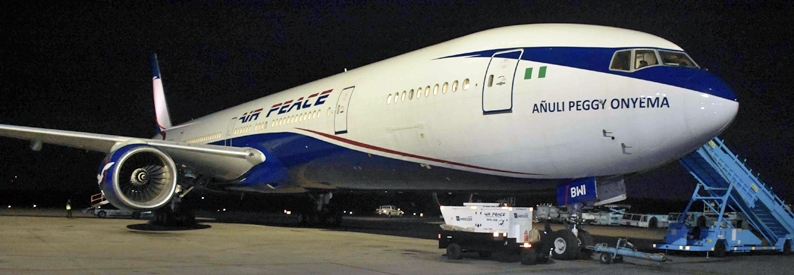UAE backs down in slot row with Nigeria

In what appears to be a reconciliatory move to resolve a diplomatic dispute between Nigeria and the United Arab Emirates about slot availability, the Dubai Civil Aviation Authority has offered Nigeria’s Air Peace (P4, Lagos) twice-daily slots (bar Saturdays) to Dubai Int’l.
In a letter to the airline dated December 13 and signed by Director-General Mohammed A. Ahli – a copy seen by ch-aviation – states: “Relations between our two countries go a long way back and we value these relations immensely. We surely wish to facilitate easy and safe travel for the people between our two brotherly countries”.
Ahli advises that – “as a gesture of goodwill in support of UAE and Nigeria relations and case Air Peace wishes to start their flights [to Dubai International]” – slots have already been blocked by the airport. He requests the airline to advise by December 16 if it wants to use the slots as these cannot be held open indefinitely. Ground handling quotations were also being prepared.
Air Peace was not immediately available for comment.
This follows after Emirates (EK, Dubai Int’l) suspended its flights to Nigeria as of December 13, 2021, after Nigeria withdrew all but one of Emirates’ winter frequencies to Abuja. The tit-for-tat came after its Emirati counterpart – the General Civil Aviation Authority (GCAA) – had awarded only one of three requested frequencies to Sharjah to Air Peace, citing the unavailability of slots.
The NCAA initially had approved Emirates’ winter schedule of 21 weekly flights to Nigeria, comprising 2x daily flights to Lagos and one daily flight to Abuja. However, in return, the GCAA had only granted Air Peace one in three weekly frequencies sought for Sharjah.
Nigerian Civil Aviation Authority (NCAA) Director-General and Chief Executive Officer Musa Nuhu said a series of meetings between the two regulators on the sidelines of the ICAO Air Negotiation Conference (ICAN) in Bogota, Colombia was unable to resolve the impasse.
The GCAA responded saying the NCAA’s decision was “totally unjustifiable”. UAE Minister of Economy and GCAA Chairman Abdulla Bin Touq Al Marri, in a letter to the NCAA, blamed Air Peace for not securing all three slots at Sharjah Airport. “Air Peace initially operated at Sharjah Airport, shifted to Dubai Int’l, and then returned to Sharjah Airport. It would be unreasonable for an airline to expect any airport to maintain their slots when they ceased operating at that airport. In this regard, we wish to kindly advise you that Sharjah Airport is currently operating at 140% slot capacity, but with goodwill and the tremendous effort on their side, this airport was able to accommodate Air Peace with one of the three slots that this airline requested,” the GCAA said in a statement. It suggested that Air Peace consider flying their two other frequencies “to any UAE airport at which there are available slots”.
Air Peace Chief Operating Officer Oluwatoyin Olajide then got involved in the dispute by publishing an open letter to Nigerian Aviation Minister Hadi Sirika, in which he took “very serious exception” to the GCAA letter. “We do not see what wrong Air Peace has done in this whole saga. We are the ones being wronged and now we are being attacked from a quarter we least expected,” he complained.
Olajide said Air Peace had never flown to Dubai, even though it had been the airline’s first choice. “It was the politics of slot unavailability that did not allow us to operate into Dubai Int’l Airport directly. The lack of flight slot angle forced us to approach the Sharjah Airport as the last resort,” he said.
He also denied that Air Peace had stopped flying to Sharjah. “We only stopped when every other airline was forced to stop normal scheduled flight operations as a result of the COVID-19 lockdowns that permitted only evacuation flights.”
He said Air Peace was also denied permission to operate a charter into the UAE on December 1 after restrictions on scheduled flights between both countries were lifted at the end of November. Olajide said the GCAA had insisted the Nigerian carrier operate a scheduled flight, but had denied the slot only 48-hours prior to departure. “When we pressed on, they told us that they would accept us only if we did not bring a wide-body aircraft but a small one. We had 250 passengers to transport and using a small aircraft as they suggested was impossible,” he explained.
Emirates in a statement said it was “committed to its operations in Nigeria, and we stand ready to reinstate services once restrictions are lifted by the Nigerian authorities”. The airline had just resumed services on December 5, 2021, after it was banned from Nigeria in March 2021, after the carrier had imposed additional COVID-19 test requirements on passengers from Nigeria. In September 2020, Nigeria had also blacklisted Emirates over quota system restrictions imposed on Nigerian travellers to the UAE.
Meanwhile, Nigerian news sites Nairametrics and Ladun Liadi on December 14 reported that Nigerian passengers on board an Ethiopian Airlines (ET, Addis Ababa) flight to Dubai had been off-loaded. Passengers, who shared their experiences, claimed that all Nigerians were barred from the UAE because of the diplomatic row.
